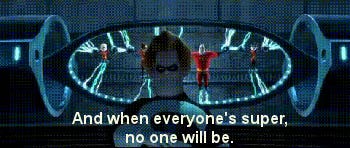The internet loves the propagation of a misattributed quote. There are entire cottage industries on Etsy and elsewhere, built around quotes of questionable lineage, not to mention quotes that aren’t even actual quotes.
Exhibit A: the well-meaning Christian quote attributed to both Jesus himself and, interestingly enough, to….Mae West? Not to be found anywhere in the Bible1, though, unless you get extremely liberal with the ellipses, like so:
“I never2…..said it3…would4…be5…easy6. I7… only8 …said it9… would10 …be worth11 …it12.”
A friend of mine made a needlepoint in fancy, scripty lettering that said:
“I never said ‘I never said it would be easy, I only said it would be worth it.’”
Maybe it makes me irreverent or sacrilegious but I think the idea’s clever, especially in how it riffs on the whole pseudo-inspirational, homey “Live/Laugh/Love” kitchen signage thing while also telling the truth about the quote. I guess in the end I kinda find myself on the side of “there are enough actual Jesus quotes that are really good, why are we inventing new ones?”
Like, why don’t we all just try to do a little better at “love one another”? Let’s start there.
Another quote that it seems pretty clear the widely-quoted person never said? This one “by Albert Einstein.”
“Everybody is a genius. But if you judge a fish by its ability to climb a tree, it will live its whole life believing that it is stupid.”
Behold! The Etsy-fication of the “quote”:







Now there is no shortage of reasons—beyond just the fact that Albert Einstein never even said it—to take issue with this quote. The easiest and most obvious being that, in my experience and with a litany of overwhelming empirical evidence, not everybody is a genius. While I do carry with me the humanist view that everybody has something unique to offer and that the world is a better place when we each do our unique thing, I draw the line at “genius.” We’ve gotta keep some room above to aspire to, make sure words don’t lose their meaning. Let’s reserve “genius” for, well, geniuses—whether they’re mathematical or musical or creative or engineering or plumbing. Maybe I’m kvetching over semantics here.
A second critique that upends the whole “quote”? Reality. The implication that the fish KNOWS you’re judging it and its tree-climbing (in)abilities. And that, based on your judgment (which you have communicated to said fish via….hand signals? a well-crafted diorama? Aquaman brain stuff…like ichthyotelepathy?), said fish has concluded that it is stupid. And that’s to say nothing of fish being able to conclude, much less delineate stupid from smart. And then, ostensibly, feel badly about it?
I can suspend disbelief pretty well, but that’s a prrrettty long walk.
At the heart of it and in spite of my reservations, I do think the quote contains some vital truth. And that is: there are SO MANY talents13 in the world and it’s a fool’s game to judge Joni Mitchell by her mathematical prowess14 or Pythagoras by his songwriting. Our expectations15, often untethered to reality, can wreck someone—can wreck ourselves!—if we’re not careful.
Again, I’m not saying we have to treat everyone like geniuses. But I do believe it’s worth looking for what people are uniquely tailored to do and try to see them through that lens. And to extend a similar grace to ourselves.
On a good day, I’d put myself in the school of thought of Emmylou Harris, one of my favorite harmony singers ever, someone who can make almost any song better, who is creative and soulful and—most crucially—wholly unique.
When Emmylou Harris is singing, you never wonder who’s singing—but not in an obnoxious, oxygen-hogging, spotlight-hunting, pick-me-girl16 sort of way. So, no, her voice is not wallpaper. She is not sonically anonymous. She is Emmylou Harris; she knows it and, once you hear the song, you know it too.
That’s a lot of context, but I think it helps underline her quote, which goes like this:
Style is a product of your limitations.
I take that to mean that style is as much what you can do as it is what you cannot. And maybe even what you will not (or choose not to) do. In the interview, I believe the point she was making is, to paraphrase, “style is what you do with what you’ve got (and don’t got17).”
So that’s how I feel about all this fish/tree/talents/genius business on a good day—embracing it, using its momentum to gain my own, not worrying about what I can’t do but instead owning what I can, basking in the glory of my uniquetude. “I’M THE GREAT & FABULOUS ME! DEAL WITH IT, WORLD!” I shout.
OK. I don’t shout. I think loudly to myself, though. My lips might even mouth the words.
But what of the bad days? How do I feel about it all then?
I’ve had two experiences recently where I knocked my skull up against the other side of Emmylou’s wisdom and “Albert Einstein”’s quote.
The first was the re-forming of my high school band, The Spiders18 for our 30th High School Reunion last month. As my three friends and I rehearsed our handful of “songs from the 90’s”, and as my hoarse-y baritone strained to try to hang with tenor-sung19 songs by The Black Crowes and AC/DC, I had a moment of genuine20 PTSD. I was slurped violently back in time to our drummer Barrett’s basement and the many, many times I had slammed (valiantly! courageously! hopelessly!) against the impermeable ceiling that was21 my very, very limited vocal range. This was an era when tenors were king, at least for white teenage boys—Soundgarden, Rush, Led Zeppelin, Alice In Chains, Blind Melon, Guns N’ Roses, Jane’s Addiction, Van Halen, The Samples, Sting, Living Color, Nirvana, REM, Peter Gabriel, U2, The Who, Neil Young, The Beatles….most of whom have very few songs I could sing all the way through without either going into a wimpy falsetto or thrashing my vocal cords WHILE STILL FAILING (valiantly! courageously! hopelessly!) TO HIT THE NOTE(s).
It was demoralizing back then. All these songs we wanted to play and I simply couldn’t hit the notes. (To be fair, we didn’t know any dude who could or we would’ve recruited them.) Not that it stopped us from trying. There’s a cassette tape in my garage on which one can hear The Spiders playing during the East High School lunch hour one afternoon and trying a furious version of “Smells Like Teen Spirit” and me giving my all-American best and just utterly flailing. Calling what I was doing “yelps” would be generous. It’s the sound of a fish trying to climb a tree and just ending up with horrific bark burns.
In the house I grew up in, we heard a lot about limitations. A Top 5 quote from my dad was “argue for your limitations and they are yours.” He was trying to instill confidence and growth mentality in us, both good things.
And I think in a lot of ways he did. One of my siblings even created a companion piece to dad’s quote, probably for some school Reflections art contest. I remember it as maybe a quilted, stitched, fabric type thing that hung on the wall, with a felt guy standing at the top of a mountain and the words:
“If you think you can or you think you can’t, you’re right.”
An inspiring sentiment, to be sure.
But let me tell you, dear reader, that no matter how much I thought I could hit the notes that I so badly yearned to hit, I could not hit them. No amount of positive mental attitude or studious vocal warm ups or consistent practice or prayer was gonna get me within the same postal code as those notes. I have rarely wished for anything harder than I wished to have one of those voices.
Hence, my later-in-life embrace of the Emmylou Harris quote. An attempt to make peace with limitations and turn them into style, turn them into strength, turn them into, well, something to be proud of.
The second experience in which that peaceful acceptance and proud ownership has been tested is ongoing, as I prep for a tribute show next month where we’re going to play Weezer’s first two albums in their entirety.
I was actually surprised when the humbling moment hit. For all the tribute shows I’ve helped put together, during the first couple weeks of rehearsals, I usually sing the vocal (I call it a dummy or guide vocal) just so the band knows where they are and gets some reps with someone on the mic. I figured I’d have no problem with Weezer. Nothing about Rivers Cuomo’s voice shouts “range” or “difficulty.” (And, sadly, I should note that for most people it probably isn’t difficult.) But, here I go again, trying to hit notes that my combination of vocal folds and my larynx and genetics and tooth placement22 and all that just don’t cooperate with.
It’s easy to leave our rehearsal space, after a couple hours of shredding my vocal cords, warbling unsteadily like a puberty-stricken teen23, barely any voice left to speak, and feel totally sapped of any confidence. To drive home to a mental voiceover narrative about “maybe I’m not actually a good singer.” To feel like the fish, slapping its scales pointlessly against the tree. Flopping. Embarrassing. “What is that fish even trying to do?” onlookers might laugh.
In this case, I can lean on the idea that I’m doing it “for the greater good” even if my ego takes a beating while sounding terrible in front of the musicians in the band. I soldier through it, ostensibly knowing that it’s just placeholder and eventually a singer who’s a better fit will step in and sing the ever-loving crap out of the song.
That’s actually a rewarding and magical part of every tribute show—the moment when the band, who have been working tirelessly to get sharp, and the singer finally meet. And the singer is lifted up by the band. And the singer, with a voice suited for the song, lifts the band too.
And then I just sing the one song in the whole show that fits the admittedly-narrow sweet spot of my voice. And I feel great again.
It’s not easy, but it feels worth24 it.
King James Version, at least. Perhaps one of the more modern interpretations has it, though.
Matthew 7:23
John 11:42
Mark 10:36
Luke 6:20
Matthew 11:30
Matthew 4:19
Mark 5:36
John 11:42
Luke 18:13
Matthew 10:13, give or take a “y”
John 6:20
I recently gave a talk in our congregation’s sacrament meeting about the concept of particularism and talents and gifts, but we can get deeper into that another day.
Please, whoever you are, save your breath and don’t bother to tell me that Joni Mitchell is actually really good at math because (evidence) or because (songwriting requires math) or because (other reason). IT’S JUST TO ILLUSTRATE A POINT.
“Expectations are resentments under construction.” -Anne Lamott, probably, but don’t cross-stitch it or get a tattoo of it without looking up the source yourself.
Thank you to my kids for introducing me to this term. I feel so 21st century.
Forgive the grammar. The matching construction was too tempting.
We discovered, as people posted clips on social media of us playing the songs at the reunion, that most people assumed we had—in a nod to the Beatles—changed the spelling to The Spyders. We had not. We were more basic than they could ever have imagyned.
wailed? screamed? howled? yowled? caterwauled?
It was real. I’m not saying it was even in the neighborhood of wartime PTSD, just to be clear. I’m just saying that I legitimately got swept up in the awful feelings I thought I’d left 20-30 years behind me. I was 17 again and not in a fun way.
is
There are rumors that several singers have refused to get dental work for fear of messing up their voices. Freddie Mercury and Jewel, just off the top of my head.
Matthew 10:13, give or take a “y”








